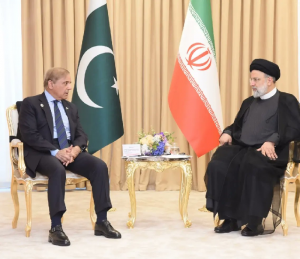Iran is prepared to meet the requirements for energy.
targets $5 billion in bilateral trade for 2023.

Pakistan and Iran can boost their bilateral commerce to $5 billion in 2023 by taking advantage of their crucial geostrategic location.
An Iranian delegation that included the Consul General of Iran Hassan Nourian, well-known Iranian businessmen, and a few Iranian parliamentarians paid a visit to the Karachi Chamber of Commerce and Industry (KCCI) on Thursday. The delegation was led by the president of the Iranian Chamber of Commerce, Industries, Mines, and Agriculture (ICCIMA), Ghulam-Hosein Shafeie.
The president of ICCIMA expressed optimism about reaching the $5 billion trade goal and stated that they intended to implement a new economic strategy and make the most of the cordial relations between the private and economic sectors of the two nations to develop collaboration.
Between the presidents of the KCCI and the ICCIMA, Muhammed Tariq Yousuf and Masoud Golshirazi, a Memorandum of Understanding (MoU) was also signed in order to lay the groundwork for the growth of business ties between the two chambers and to outline the cooperative processes that could help them achieve their shared economic goals.
Shafeie emphasised that “Iran is prepared to accommodate Pakistan’s expanding needs in the energy sector.”
While the delegation was visiting the federal chambers, Irfan Iqbal Sheikh, President of the Federation of Pakistan Chamber of Commerce and Industry, stated that the real potential for bilateral trade between Pakistan and Iran amounts to at least $5 billion in the near term and can materialise by next year.
He went on to say that many geographically contiguous and developed countries conduct 70–80% of their overall trade through land-based and border trade since it is both cost-effective and helps reduce shipping expenses. Highlighting potential obstacles Pakistan might face in accomplishing its trade goals with Iran, The United States has granted exemptions to nations like Turkey, Iraq, India, and others, allowing them to deal in the energy industry with Iran, but has not extended such favours to Pakistan, according to Ahmad Jawad, Vice President of the Pakistan Businesses Forum (PBF). The Financial Action Task Force (FATF) blacklisting of Iran is another issue for Pakistan. The FATF does not forbid commercial dealings with nations on its list, but doing so could draw attention to Islamabad on a global scale. Although the prospect of international sanctions continues to be a major issue for Pakistan, it does not prevent economic cooperation between Pakistan and Iran. In any scenario, to prevent US sanctions from being triggered, Pakistan and Iran may also conduct their commerce through barter.
Jawad continued, “Islamabad should strengthen connections with Tehran because of Iran’s status as a regional force and its oil and gas riches. Beijing is currently the biggest consumer of Iranian oil in our neighbourhood, buying 25% of Tehran’s imports.











































